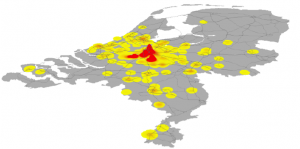Advanced Geo-information Applications
This module synthesizes all other content of modules 1 through 5. It is a follow up of Module 2 regarding the applications; a follow up of Module 5 regarding the contents; and it provides an impression of the remaining part of the GIMA course.
Themes 
- Volunteered Geo-information and open data
- Spatial (GIS) models and databases
- Spatial Simulations
- Webmapping and webapplications
Course objectives
The student will be able to:
- Integrate knowledge and skills of the previous modules (1, 2, 4, 5);
- Apply project management and progress monitoring skills to prepare, plan, execute, manage and monitor a GIS project;
- Summarize and report relevant and state-of-the-art research relevant to the project by executing a scientific literature study.
- Independently use appropriate GI techniques and methods in the context of specific applications;
- Present the methodology and results in an appropriate manner for a specific context;
- Develop a critical attitude towards data and data processing methods;
- Evaluate organisational restraints and consequences.
Content
During the first two days the participants have lectures about the course set-up, project and organisational management, research methods and case specific information. Examples of projects are given and discussed and a start is made with setting up the project. Depending on the topic chosen in module 5, students choose from different cases, which include:
- Road Modality & Occupancy Patterns web (TUD)
- Roof-Mounted Photovoltaic Solar Panels (TUD)
- Finding geo-data produced by the crowd (ITC)
- Spatial temporal land use modelling (WUR)
- Air Quality and Route Planning (WUR)
- Generating DEM from stereophotos (UU)
Together with three or four other students, the student works on the case he/she picked. The group work includes: writing a project plan, preparing data, data analysis, visualizing results and scientific reporting. In the last week of the module the students will present their case.
Type of education
- Lectures
- Supervisor discussions
- Distance learning
- Literature research
- Project Plan
- Reporting
- Presentation
- Evaluation
Assessment
- – Project results (presentation, report, individual assignment)
- – Individual assignment
Literature
Literature is dependent on the selected case to serve as academic theory.
Entry requirements
- Letter of acceptance of the master programme Geographical Information Management and Applications
- Passed Module 1 (GEO4-GIMA1)
- Passed (or actively participated in, and about to pass) Module 2 (GEO4- GIMA2). If grade of Module 2 is not yet published at the start of Module 6, students may nevertheless start with Module 6
- Students who have a pass grade (5.5 or higher) on the basis of the breadthfirst part of Module 5 (including both breadth-first assignments and breadthfirst exam, and without supplementary test) are allowed to start with Module 6.
- Students who do not meet rule 1, but have a pass grade (5.5 or higher) on the basis of Module 5 as a whole (all components of breadth-first and in-depth, and without supplementary test) are allowed to start with Module 6.



